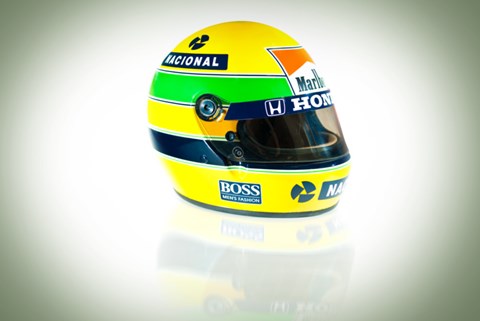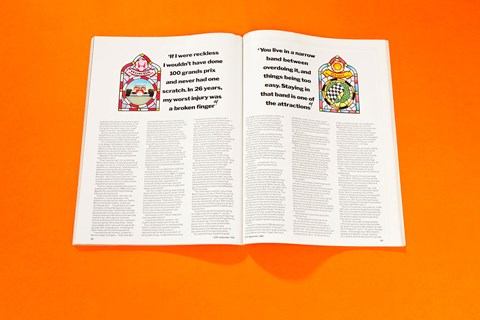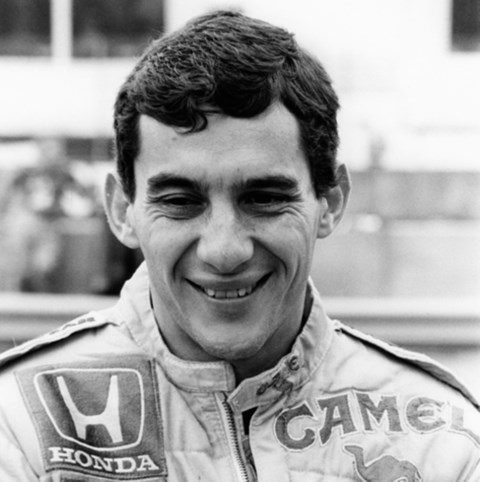► Russell Bulgin interviews F1 star Ayrton Senna
► The F1 legend talks candidly about his emotional bond to racing
► An archive feature from CAR magazine, September 1990
Ayrton Senna da Silva — he dropped the da Silva bit early in his racing career— is a complex man: a loner, a born-again Christian, a driver more determined than anybody else to be the best. But he is not a popular man: many of his fellow drivers consider his race-craft too aggressive and his dedication too obsessive. He has been racing for 26 years, even though he turned 30 only last March. He began racing karts around the Parque Anhembi in his native Sao Paolo. His father, a wealthy businessman-turned-farmer, employed a man to pick up Senna from school and drive him across town to go karting. His first ‘serious’ race was at the Interlagos circuit in 1973. He won it. He took the Brazilian kart title every year from 1978 to 1981. He came to Britain in 1981, to drive a works Van Diemen in Formula Ford races, winning 13 events: And then retired, citing home sickness and marriage problems as the reasons. But Senna returned to Britain, got divorced, and took 22 Formula Ford 2000 wins from 28 starts. He won the British Formula Three title the following year, 1983. In 1984 he invigorated the Toleman Formula One team, finishing sixth in his second race, and almost beating Alain Prost in the wet at Monaco. By the start of this season, Senna had won 20 grands prix. He was world champion in 1988
Are you a happy man? Ayrton Senna — pale, gaunt, quiet— looks puzzled: ‘Today, no. Today I am jetlagged. But usually, yes.’ But, in Formula One, you’re perceived as a solitary obsessive with strong religious views. An oddball. Three days after the Mexican Grand Prix, which he led for 60 laps in his Marlboro McLaren Honda before a slow puncture separated the right rear tyre from the rim and cost him the nine points of victory, Senna is testing at Silverstone. He’s tired, but he will talk. Softly. Taking his time. Thinking. Never hurried. When he smiles, his face lightens, the patina of weariness shifts.
‘Of course, if you have a good result at the weekend it helps you to recover physically. When you have given everything you have, and suddenly the thing goes wrong — it’s difficult to cope with. And it takes days to come back.’ Right now, Senna is talking to other teams about 1991. His McLaren contract expires at the end of the year. His pay-packet for next year is reputed to exceed one million dollars per race.
What matters most: the cash in hand, or the status such an immense sum confers among his peers?
‘l want the maximum in all areas. I give my maximum. I want the maximum. That means the best car, the best people to work with, a pleasant, competitive atmosphere, and the material benefits that come from that.’

‘Material benefits’ sounds like a euphemism for megabucks his McLaren boss Ron Dennis would use. Senna says right now every drive in Formula One is available to him. That, in itself, is a pressure: ‘l have to keep a completely open mind because, although the material benefits are a complement of the whole thing, the ability to win is the only motivation that keeps you going, race after race, through situations like last weekend. If you don’t have that, nothing else can make you work.’
The conversation slides gently away from contracts and lawyers and the cattle-market of driver movements.
Mexico marked Senna’s 100th grand prix start. Since his debut in 1984 he has taken 23 race wins, 46 pole positions and the 1988 world championship, displaying a level of competitiveness extraordinary in any sport. How do you maintain this level of intensity on track?
‘First of all, I only know one way of doing it. That’s, perhaps, the answer. I don’t know another way, or a different way, of doing it.’ A shrug. ‘Basically, I’ve done it throughout my life. It was my hobby, not my profession. I enjoyed just sitting in a go-kart and driving — nothing else. On my own, most of the time. With nobody else.
‘At the beginning, I was just doing it for the feeling of driving: I liked the feeling of moving the steering wheel, braking, putting on the power, feeling the engine, listening to the engine, feeling the air on your face, the speed. It was something that got to me when I was a kid: it got inside of me then. And stayed there.’
But you’ve been quoted as saying that everything in your life comes to a point when you sit on the grid: that the very act of driving gives you a feeling of re ease.
‘It’s a focused situation, where you tend to go deeper and deeper in order to find the next step. The situation takes you to a different world. Because you have this research for going into areas, into places, where you have never been before.’
Research? So driving is a process of mental discovery?
‘That’s exactly right. It’s something that is very lonely in a way, because once you get in a car, on a circuit, it is yourself and the car, nothing else. That situation is extremely absorbing. And, perhaps because I have often experienced the feeling of finding new things, even if I thought, “OK, that is my maximum”, then I would suddenly find something extra. That process is almost non-stop in terms of excitement and motivation.’
There’s a story whispered about you in qualifying for Monaco in 1988, when you, apparently, almost felt that somebody else was driving the car.
Taken out of context— the man, his reputation, his racing record — the question sounds faintly ludicrous. Not to Senna. He smiles slightly: ‘It was not somebody else . . . In qualifying, we used race tyres, not qualifying tyres, so you could do many laps. I remember starting: going quicker and quicker. I was on pole. I was on pole by a few tenths (of a second) and then by half a second, and then almost a second and then over a second— I was just going. More and more — there was a stage when I was over two seconds quicker than anybody else, including my team-mate with the same equipment.
‘I realised at that moment, suddenly!’ — Senna snaps his fingers— ‘that I was well over something conscious. Monaco is small and narrow, and at that moment, I had the feeling that I was in a tunnel— the circuit was just a tunnel for me. It was going-going-going and within the physical limit of the circuit, it was like was on rails. Of course, I wasn’t on rails. Then, suddenly I realised it was much too much: I slowed down, I drove back slowly to the pits and said to myself that I shouldn’t go out any more that day.
‘Because for that moment I was vulnerable for extending my own limits, and the car’s limits: limits that I never touch before. I was not aware, exactly, of what was going on — not that I was not in control — I was just going-going-going. An amazing experience.’ Senna took pole position, on a circuit with an 86mph fastest lap, by the astounding margin of I .427 seconds.
Did that curious experience have any bearing on two occurrences: your increasing interest, since 1988, in religion and your belief in Christianity, and the uncharacteristic accident you had the following day when, apparently in complete control of the race, you lost concentration for a moment, nudged the barrier and retired?
‘No, the incident, nothing. And nothing to do with the other subject, either. I think that everyone is trying to learn new things, particularly about themselves. That is a non-stop process. There are so many things to which you just cannot find the answers, and I found a new way of life where I still want lots of answers, but I think I have a new road where I am finding those answers slowly.’

How did you find it? What made you look towards religion?
‘A growing need for answers — for myself, about myself, part of our life.’
If you’re blessed with an extraordinary talent, is obtaining a greater religious understanding simply a way of rationalising that ability to yourself: of being able to say, ‘l understand now why I was given the tools to do this job’?
Senna says nothing for 24 seconds. ‘l don’t really understand what you’re saying.’ The question is repeated. ‘l think anything that you are aware about in your life, and many other things about which you’re not aware, were given to you by Him. Whether you understand, or you don’t, whether you live that way or not, that’s the way it is. If you get to understand a little bit only, it makes so much more sense: makes things so much more peaceful to understand the difficulties — particularly — and enjoy better the good moments. So I see it just as a natural thing. Unfortunately, I had not experienced that before: I wish I had found it before — but it’s never too late.
So do you know why you’re quick? And if you don’t know why you’re so fast, can the computer equipment in the pits explain the secrets of your pace?
An 11 second pause: ‘Well, there are two ways of looking at it. From outside, you only have to look at the stopwatch and, today, looking at the data, you can see all the speeds all over the lap. So you know exactly: you can compare two different drivers in the same conditions; you know exactly where is the difference. That’s one way.
‘The other way is simply in your mind. Believing you can do it. First of all, you’ve got to have the knowledge, you’ve got to have the experience —you’ve got to have the basic feeling for doing it. After that it’s only a question of believing you can do it, and committing yourself to it, before you actually do it.
‘It’s something like knowing it’s going to happen before it happens —do you understand? It’s like believing things that you cannot see and feeling things that you are not touching. This is the key, the power, for it — if you have all the other things which you’ve got to have. Otherwise you can believe as much as you want, but it’s not going to work…’
You seem to have a psychological advantage over a lot of rivals in Formula One: you’re seen as solitary, private, introvert. Is this something that you’re aware of, an image you’ve cultivated?
‘l think that is a consequence of facts.’ This is a hard, almost ruthless logic. You mean that this us-and-him attitude just happened?
‘l don’t really have an answer to that. Simply do the thing the way I know how to: like I said, I only know one way of doing it — that’s with perseverance, determination and hard work. And I’ve been doing it for many years, not just in Formula One, but before.’

How tough is it to continue at that level? You seem, for example, to have very few bad days. Does this dedication take its toll in other ways? Are you a difficult man to live with?
‘Mmmm . . . sometimes. This is commitment. Nothing other than commitment.’
In a sport as demanding as Formula One, how can you be so committed at each race, in every practice session?
‘Nobody is the same. We are all different. Perhaps a motivating factor for me is the discoveries that I keep having, every time am driving. When I push, I go and I find something more. I go again and I find something more. That is the most fascinating motivating factor for me. The challenge of doing better all the time.’
Yet some of your rivals say that racing with you can be eerie, because you don’t seem to have a conventional sense of fear. Senna sounds a touch dismissive: ‘I think this is a way of escaping for people. t’s unreal to say those things. There is a method to what I do, a way of doing it, a thinking behind it, there is a self-control behind it, among all the emotions and feelings. If it wasn’t like this I wouldn’t be here still.
‘l wouldn’t have done 100 grands prix and never had one scratch. I wouldn’t have raced since I was four years old and only suffered a broken finger. So this is completely unreal: it’s an unfair way of escaping, instead of trying to find the true reasons and trying to improve themselves. It’s a lot easier to try and push somebody else down than push yourself up — but it’s a low way of living. It’s not for me, of course.’
What about fear? Your pole position lap at Monaco this year was captured by an on-board camera: the combination of aggression and precision was almost frightening to watch.
‘Because you were only watching. You were not doing it’ That simple.
‘If you know why you are doing it, and how you are doing it, then you feel fine. You know the limits and so on. You have it in your hands. Fear? I don’t really know the meaning of fear in terms of English, but the way I see the danger of getting hurt, or getting killed, is that any racing driver lives very close to it all the time. Because of the conditions we live in: because we are in a close relationship with that experience, consistently, we learn how to live with fear better than other people.
‘And in the process of learning how to live with it, you, of course, have extraordinary feelings and emotions when you get near to an accident, or a feeling that— uh! —you’d almost gone over the limit. It’s fascinating in a way. It’s attractive in a way. But it’s a challenge for you to control it and not exceed those limits: you’re living in a narrow band, between overdoing it and things being too easy. The challenge to maintain that band as continuously as possible is very much a motivation.’
Racing drivers rarely talk about the risks they face.
‘The day before I have to drive the car, at one of the more dangerous circuit. I think about this because I am exposing myself to a certain risk. The more calculating you can be, the less can go wrong because of an unexpected situation. Or because you make a mistake as well: your judgment goes wrong on that day, you are not 100 percent clear in your mind, and so on.
‘It takes a lot from you to maintain sharpness. At the same time, you should have no fear. Because if you have fear, you cannot commit yourself. It’s important to know what fear is, because it will keep you more switched on, keep you more sharp. It will determine, on many occasions, your limits.
‘The reality is that you are fragile. At the same moment that you are seen as the best, the fastest and somebody that cannot be touched, you are enormously fragile. Because in a split second, it’s gone. These two extremes are feelings that you don’t get every day. These are all things which contribute to — how can I say? — knowing yourself deeper and deeper. These things keep me going.’
Senna claims to have read no books on psychology.
‘The best thing that I have ever read was the Bible. There you can find all the explanations and all the answers that you are looking for. I don’t think a lifetime is enough to read it all properly.
‘I like the psychological things: I like mind-power a lot, the complexity of your body, How it’s working: how all the functions are going and you’re really not aware of it. Because it’s something so natural, you don’t give it the right value: you only really give it the right value when you have a problem with it.
‘But it’s all working in equilibrium, in the right way: we tend to forget those things. We only remember those things when we lose them. It’s good, sometimes, to have the ability to exploit those things while they are still working.’
A Honda V10 engine starts barking in the background. Ayrton Senna looks up, begins to pull his red overalls up over the flameproof T-shirt: ‘I’m sorry,’ he says slowly. ‘I have to go now.’ With that he disappears. Back to his job: back to driving fast and the discoveries it brings.